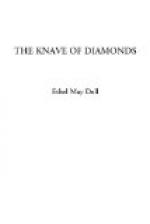“Am I forgiven?”
“For what?” she said.
“For pretending to disbelieve you this morning.”
“Was it pretence?” she asked.
“No, it wasn’t!” he told her fiercely. “It was deadly earnest. I would have given all I had to be able to disbelieve you. Do you know that?”
“But why, Nap?”
“Why?” he said. “Because your goodness, your purity, are making a slave of me. If I could catch you—if I could catch you only once—cheating, as all other women cheat, I should be free. But you are irreproachable and incorruptible. I believe you are above temptation.”
“Oh, you don’t know me,” she interposed quietly. “But even if I were all these things, why should it vex you?”
“Why?” he said. “Because you hold me back, you check me at every turn. You harness me to your chariot wheels, and I have to run in the path of virtue whether I will or not!”
He broke off with a laugh that had in it a note of savagery.
“Don’t you even care to know what was in that letter that you never had?” he asked abruptly.
“Tell me!” she said.
“I told you that I was mad to have missed you that day. I begged you to let me have a line before you came again. I besought you to let me call upon you and to fix a day. I signed myself your humble and devoted slave, Napoleon Errol.”
He ceased, still laughing queerly, with his lower lip between his teeth.
Anne stood silent for many seconds.
At last, “You must never come to see me,” she said very decidedly.
“Not if I bring the mother as a chaperon?” he jested.
“Neither you nor your mother must ever come to see me again,” she said firmly. “And—Nap—though I know that the writing of that letter meant nothing whatever to you, I am more sorry than I can say that you sent it.”
He threw back his head arrogantly. “What?” he said. “Has the queen no further use for her jester? Am I not even to write to you then?”
“I think not,” she said.
“And why?” he demanded imperiously.
“I think you know why,” she said.
“Do I know why? Is it because you are afraid of your husband?”
“No.”
“Afraid of me then?” There was almost a taunt in the words.
“No,” she said again.
“Why, then?” He was looking full into her eyes. There was something peculiarly sinister about his masked face. She almost felt as if he were menacing her.
Nevertheless she made unfaltering reply. “For a reason that means much to me, though it may not appeal to you. Because my husband is not always sane, and I am afraid of what he might do to you if he were provoked any further.”
“Great Lucifer!” said Nap. “Does he think I make love to you then?”
She did not answer him. “He is not always sane,” she repeated.
“You are right,” he said. “That reason does not appeal to me. Your husband’s hallucinations are not worth considering. But I don’t propose on that account to write any more letters for his edification. For the future—” He paused.




